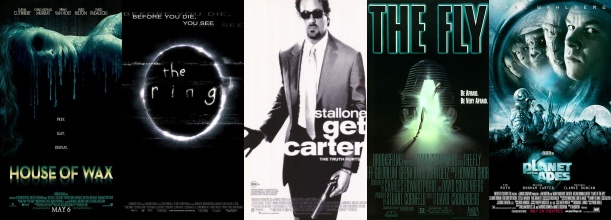Friday Face/Off: Remakes

The remake. One of Hollywood’s most controversial devices, the past few years have seen a glut of ‘reimagined’ films – and not just horror B-movies, either! Anything’s up for grabs – classic comedies, noir dramas, even musicals. But is the remake a tool which enriches the legacy of its original makers or a cheap money-spinner that devalues all those involved with both projects? Read on to find out what two of our most opinionated writers think…
For the defence:

Remakes are awful, aren’t they? The work of lazy filmmakers, they take beloved classics and turn them into unwatchable turkeys, forever besmirching the original’s good name and giving a younger generation of movie-goers entirely the wrong idea. Right? Well, no, not necessarily.
Now, I’m not here to argue that remakes are always great. If even the Coen brothers can combine classic Ealing comedy The Ladykillers, with the star power of Tom Hanks and still cock it up, then it’s safe to say we’re treading dangerous ground. But they’re not all bad. And I’m going to prove it to you.
Turning to the oft-used argument that remakes are unoriginal, I will invoke the tale of Sergio Leone’s Western classic, A Fistful of Dollars, well known to be an unauthorised rehash of Akira Kurosawa’s samurai tale, Yojimbo. “Outrageous thievery!”, you cry. Yet the estate of author Dashiell Hammett never complained, even though the makings of both films can clearly be found in his novels Red Harvest and The Glass Key. And, speaking of plotlines where one man plays rival leaders against each other, what of Carlo Goldoni’s 18th century play, Servant of Two Masters? With writers recycling stories and character archetypes for centuries now, how can we decide whose work really has right to be called an ‘original’? Find me an ‘original’ Shakespeare tragedy and I’ll be very impressed.
With this in mind, let’s move to the second most common complaint leveled at remakes; namely the idea that they’re not very good. If the above example isn’t enough to disprove this fallacy (the Clint Eastwood starring classic is certainly no dud), then allow me to raise further evidence.
For classic comedy, how about Some Like It Hot? A remake of the German film Fanfaren der Liebe. For a great gross-out horror, look no further than John Carpenter’s The Thing, which re-imagined 1951’s The Thing From Another World. Michael Mann has us covered for crime dramas, with his De Niro/Pacino crossover Heat being reworked from the script of a 1989 TV movie – admittedly his own 1989 TV movie, but it’s a remake nonetheless. Martin Scorsese has even deftly tackled the now ever controversial foreign language to American conversion, with his multi-Oscar winning The Departed presenting his take on the contemporary Hong Kong thriller, Infernal Affairs.
But I have saved the clincher for last. Brace yourselves, for the thing you’re about to imagine is not pretty. In a world without remakes, there would be no Airplane! With large chunks of the film’s script directly transferred from un-ironic air disaster flick, Zero Hour!, it’s fair to say that Jim Abrahams and the Zucker brothers made the material their own. With their mocking of genre conventions and a silliness that just can’t be beat, the result is one of the finest comedies ever made. Do you really want to throw that away? Ladies and gentleman of the jury, the defence rests.
By Patrick Harley
For the prosecution:

Marlon Brando was a superb actor. No argument there? Good. So was Sir Laurence Olivier. So was Katharine Hepburn. Unfortunately, they’re all dead. Does that mean we should train up young but manifestly less talented actors to redo all of their roles, purely so we can produce films by thieving their hard-earned reputation and putting in little or no original thought? Obviously not – that would be ridiculous. Why, then, do we insist on insulting the directors of yesteryear in this crass manner?
The major criteria for a remake seem to be threefold – either the source film is sufficiently old that some numbskull producer can claim its meaning is obscured by the mists of time, it’s been made by an independent or – gasp! – non-American studio, or it’s any sort of horror film at all. The last category is particularly ridiculous – it seems as if no horror film from America or elsewhere can be left alone or more than a decade before it has Eli Roth forcibly injected into it. Halloween, Nightmare on Elm Street, The Ring, The Texas Chainsaw Massacre, The Hills Have Eyes, House of Wax, Friday the 13th, The Amityville Horror, The Grudge, When A Stranger Calls, The Eye, Dawn of the Dead… need I go on? If it’s got gore and tits, it’s due a remake. If it’s got Japanese actors and English subtitles, it’s definitely due a remake. If it has any sort of commercial potential but inexplicably doesn’t have tits, something’s gone badly wrong – call Rob Zombie and get the ruptured cheerleaders in here, stat!
Admittedly, few if any of these films were classics to start with, and it’s still offensive that they’ve been messed around with. Why, then, must my misery be compounded by the BASTARDS who interfere with genuinely significant pieces of cinematic history? I refer you to the remakes of The Italian Job, Alfie, Sleuth and, Christ preserve us, Get Carter. And those are only the ones starring Michael Caine!
If a film is made well and has something pertinent to say, then it will always be worth watching. Some aspects of it, it is true, may be lost in transit when it is plucked from its own age and displayed to a new audience, but this is inevitably made up for by the added interest which comes from trying to imagine the cultural context in which it was originally seen. The 1985 scenes in Back to the Future, for example, obviously didn’t seem dated to contemporary audiences, but they embody their time period in a way which makes them hugely culturally significant to later generations. This rule applies indiscriminately – nobody’s suggesting that Banksy’s Mona Lisa stencil should supersede the original or that a DVD of Romeo Must Die renders live Shakespeare obsolete, so why can great cinema not be revered for its own sake? With their obsessive updating and reimagining, the directors of remakes are unwittingly devaluing the whole of cinema as an art form.





Recent Comments